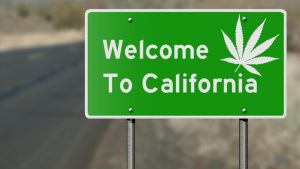How California Sneakily Banned CBD Cosmetics
Overall, it seems that the state's Department of Public Health is trying to make the hemp industry’s life more difficult.
 While California led the charge to legalize marijuana, more precisely defined as “cannabis” under state law — I know, it’s confusing — the state has also repeatedly failed to forge a legal path for hemp-derived products, including cannabidiol (CBD).
While California led the charge to legalize marijuana, more precisely defined as “cannabis” under state law — I know, it’s confusing — the state has also repeatedly failed to forge a legal path for hemp-derived products, including cannabidiol (CBD).
Following the passage of the Agriculture Improvement Act of 2018 (the 2018 Farm Bill), the California Department of Public Health (CDPH) released an FAQ entitled, “FAQ – Industrial Hemp and Cannabidiol (CBD) in Food Products” (emphasis added by the CDPH), which provided that hemp, including CBD, could not be added to any kind of ingestible product like foods, beverages, dietary supplements, or animal products. Interestingly enough, there wasn’t, and still isn’t, any state law that actually prohibits adding hemp or CBD to finished products intended for human consumption. Instead, the CDPH adopted the federal FDA position.
Although the FAQ did not expressly say so, it was clear from its reading that the CDPH treated hemp-derived ingestible products adulterated under the state’s Sherman Food, Drug, and Cosmetic Law (the Sherman Law), the state equivalent of the federal Food, Drug and Cosmetic Act (FDCA). In fact, local agencies, like the Los Angeles County Department of Public Health, later issued their own statements, which expressly categorized these products as adulterated, ostensibly confirming the CDPH’s unexpressed position.

The Business Case For AI At Your Law Firm

Therefore, without going through the proper rule-making process, the CDPH effectively banned hemp-derived consumables, a policy that local agencies proceeded to enforce.
At that point, it was unclear where the CDPH stood on the legality of hemp-derived cosmetics. Under the Sherman Law, the state has the authority to regulate cosmetics, thus many interpreted the agency’s decision not to address this category of products in the FAQ to mean it tolerated them.
Then in January 2021, the agency shattered this assumption when it quietly issued a revised FAQ, entitled “CDPH Information on Industrial Hemp (IH) Derivatives Including Cannabidiol (CBD)”. The one-page FAQ starts out by expressly adopting the FDA’s position banning CBD as a food additive (for human and pet consumption) or dietary ingredients, then goes on to expressly state that CBD is an adulterant in food and cosmetics. Specifically, the FAQ provides that:
California’s Sherman Food and Drug Law provides that any food (which includes beverages and pet food) is adulterated if it is, bears, or contains any food additive that is unapproved, and that a cosmetic (which includes lotion and salves) is adulterated if it bears or contains any poisonous or deleterious substance that may render it injurious to users under the conditions of use prescribed in the labeling or advertisement of the cosmetic, or under conditions of use as are customary or usual.
Hulled hemp seed, hemp seed protein, and hemp seed oil are the only components of hemp that are GRAS and allowed in food. CBD derived from hemp or any other source is currently not allowed in any of the items regulated by the Food and Drug Branch of the California Department of Public Health, including foods, drugs, and cosmetics.
(Emphasis added).
Sponsored

The Business Case For AI At Your Law Firm


Navigating Financial Success by Avoiding Common Pitfalls and Maximizing Firm Performance

Early Adopters Of Legal AI Gaining Competitive Edge In Marketplace

Is The Future Of Law Distributed? Lessons From The Tech Adoption Curve
This language makes it abundantly clear that the CDPH now bans hemp-infused cosmetics sold in the state, except for those infused with hemp seed ingredients deemed GRAS. This position is even more restrictive than the FDA’s stance on this category of products. Overall, it seems that the agency is trying to make the hemp industry’s life more difficult. As I have previously discussed, many states have sensibly responded to the lack of federal regulations by adopting their own sets of laws and regulations to regulate hemp-derived products and ensure they are safe (i.e., not adulterated) for consumers. Unfortunately, California — the largest economy in the country — has decided to adopt the counterproductive approach of banning these products, despite their clear presence and popularity in the state.
This latest development is obviously bad for companies manufacturing, selling, and distributing hemp-derived products. The only potential hope is that California lawmakers may manage to bring AB-45, a bill that proposes to legalize a wide range of hemp-derived products, to the finish line. If enacted, the bill would force the CDPH and other local agencies to finally regulate hemp-derived products and provide Californian consumers with the peace of mind that the products they so wish to consume are safe.
Nathalie Bougenies practices out of Harris Bricken’s Portland office and focuses on the regulatory framework of hemp-derived CBD (“hemp CBD”) products. She is an authority on FDA enforcement, Food, Drug & Cosmetic Act and other laws and regulations surrounding hemp and hemp CBD products. She also advises domestic and international clients on the sale, distribution, marketing, labeling, importation and exportation of these products. Nathalie frequently speaks on these issues and has made national media appearances, including on NPR’s Marketplace. For two consecutive years, Nathalie has been selected as a “Rising Star” by Super Lawyers Magazine, an honor bestowed on only 2.5% of eligible Oregon attorneys. Nathalie is also a regular contributor to her firm’s Canna Law Blog.
Sponsored

Is The Future Of Law Distributed? Lessons From The Tech Adoption Curve








